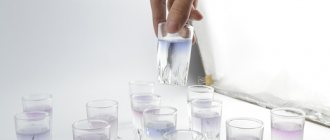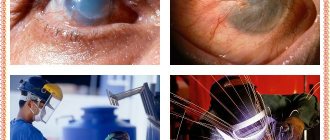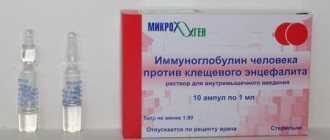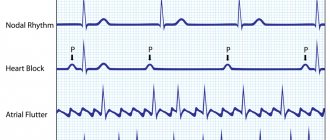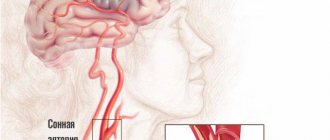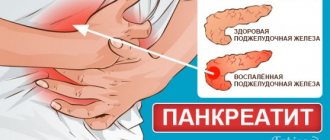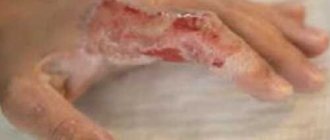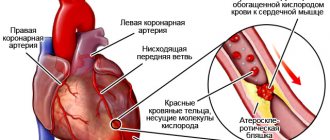Treatment of poisoning depends on the type of intoxication. There are 2 categories of disease - toxic infection and non-infectious. Infection occurs when consuming products with pathogenic bacteria. Violation of the thermal processing of food and failure to comply with personal hygiene rules contribute to the proliferation of microbes in the gastrointestinal tract with subsequent symptoms of intestinal disorder.
Non-infectious poisoning develops from the consumption of inedible mushrooms, chemicals, and poisons. Laboratory tests do not detect pathogenic flora in the intestines, but symptoms may be acute. Most toxic syndromes due to infection and non-infectious intoxication can be treated at home; only severe ones require hospital care. It is difficult to assess the severity of the pathology on your own, so it is recommended that if intestinal disorders occur after eating low-quality products, you should seek help from a doctor.
Briefly about possible reasons
You can be poisoned by anything - food, drink and even air
There are many types of poisoning, and proper assistance to the victim is impossible without knowing the “culprit,” since the principles of therapy in one case may differ radically from similar actions in another situation.
The most common causes of household poisoning are:
- spoiled food;
- insufficient heat treatment of some ingredients (meat, fish, mushrooms, seafood);
- ingestion of household and garden chemicals into the stomach or respiratory tract;
- medicines;
- carbon monoxide;
- toxic substances taken orally during a suicide attempt (vinegar, acid, alkali);
- alcohol;
- nicotine.
In everyday life, people are most often poisoned by spoiled food.
IMPORTANT! In order to quickly and correctly cope with intoxication, you need to know its cause, otherwise it is better not to take any action until the doctor arrives, otherwise you can objectively make it worse.
What drinks can and should you drink?
It's better to drink any available drink than not drink at all.
The main danger of poisoning is severe dehydration, since in the process of vomiting and diarrhea the victim loses not only the supply of fluid, but also the salts and minerals necessary for normal life.
And the key task of those helping is to quickly replenish the deficiency of moisture and nutrients. Special preparations, which in medical parlance are called oral rehydration solutions, are remarkably helpful in this regard.
They can be easily found in any pharmacy:
- Regidar;
- Regidron;
- Hydrovit;
- Regidron Bio;
- Humana Electrolyte;
- Enterodesis.
The most affordable, including cost, is Regidron, which is an odorless white powder. It is produced in paper bags that are easy to tear in any conditions. The packaging also contains brief instructions for preparing the solution.
But how to drink Regidron in case of poisoning is determined in each specific case: the stronger the intoxication, the more intense the vomiting and diarrhea, the more and more often you need to drink this solution. There simply cannot be an overdose with pathological losses of fluid and salts.
A new version of the drug with flavoring and sweet taste
ATTENTION! According to the latest WHO data, children under one year of age should not be given Regidron for poisoning and other conditions associated with a lack of fluid in the body. It is also advisable for parents to know that the taste of this solution is quite specific, so if possible it is better to find and purchase sweet preparations designed specifically for children. For example, Humana Electrolyte or Hydrovit. Yes, their price may be much higher, but you won’t have to dance with a tambourine on a sick child or force him to drink nasty water.
https://youtu.be/PgPZ3FztaKI
Folk remedies
For mild forms of food poisoning, you can use folk remedies. But not all of them are effective, and some can even lead to dire consequences. Therefore, before starting self-medication, consult your doctor.
Examples of folk recipes:
- Cinnamon infusion . Has an antispasmodic effect. Preparation: 0.5 tsp. ground spices, pour 200 ml of boiling water, leave for 15 minutes, filter. Drink in small sips. The daily norm is 1.5 l.
- A decoction of honey and dill . Promotes the removal of toxins, replenishes the lack of potassium during dehydration and reduces the severity of vomiting without stopping them. Preparation: 1 tsp. dill is immersed in 300 ml of boiling water, left for 5 minutes, boiled for another 60 seconds, filtered, added 1 tsp. honey and stir. Drink in small sips on the first day.
- Yarrow decoction cleanses the body of toxins. Preparation: mix 1 tsp. plants with 500 ml of boiling water, leave for 10 minutes, filter. The finished infusion is drunk 5 times over 24 hours.
Non-medicinal drinks
Poisoning almost always comes as an unexpected nuisance, and the chance that you always have the right supplies in your first aid kit is slim.
But since the key task of assistance is to replenish fluid losses, everyday drinks can be used as necessary drinks:
- mineral water, preferably without gas;
- weak sweet tea;
- plain water from a bottle or even from the tap if it is of good quality;
- diluted juices with low concentration;
- compotes of dried and fresh fruits;
- fruit drink;
- rice water;
- milk.
Rice water is a classic in the treatment of infectious diseases
You can also prepare your own homemade analogue of Regidron by dissolving ½ teaspoon of salt and 3 full, but not topped, teaspoons of sugar in one liter of chilled boiled or bottled water.
ATTENTION! It is not recommended to use carbonated drinks, soda solution, herbal decoctions and tinctures as drinks. As for potassium permanganate, its concentration in generally accepted doses is not enough for any disinfecting effect, and a more saturated solution can cause a burn to the esophagus or severe allergies.
Medications
If it’s more or less clear with drinks, then what should you drink to treat drug poisoning?
Pharmacy counters are full of a variety of drugs that are supposedly designed to eliminate the symptoms of intoxication and quickly restore the body. Unfortunately, some of them are useless, and some are not related to acute intoxications at all.
Necessary medications
The most accessible and widespread sorbent
What to drink in case of poisoning, in addition to means that replenish the fluid balance in the body:
- Activated carbon is the first aid for food, drug and many other poisonings. However, in acute conditions you need to take it not 1-2 tablets, but at the rate of 1 gram per 1 kilogram of weight. This means that a person whose weight is 50 kg must drink 100 tablets of 0.5 grams at a time! It’s better not to drink it, but to eat it, after grinding the coal into powder.
- The second well-known useful remedy is Smecta, which is also an enterosorbent and helps get rid of harmful substances that have entered the body. It should be taken as written in the instructions.
- Another now popular drug from the same series is Enterosgel. It is available in the form of a gel, from which you need to prepare a solution yourself, and in the form of a paste for oral use.
- Polysorb also belongs to modern sorbents and is used mainly for food poisoning.
IMPORTANT! Use Smecta and Polysorb with caution in young children prone to constipation, as these drugs make defecation difficult.
You need to choose one thing; there is no point in taking several sorbents. It is advisable to always keep one of the “every firefighter” products in your first aid kit.
Unnecessary "medicines"
Unfortunately, many drugs presented on the domestic pharmaceutical market, according to international studies, do not have proven effectiveness, and some do not have proven safety.
Such means include:
- various bacteriophages, which are quite a promising development, but nothing more;
- drugs that restore intestinal microflora;
- homeopathic remedies.
IMPORTANT! Whether to spend money and time on these medications is everyone’s choice, but you must always be prepared for unexpected allergies and other unpleasant effects from use, which are hardly mentioned in the instructions.
Another question that arises when symptoms of intoxication appear is what to drink for nausea in case of poisoning. In this case, specialists categorically do not recommend using any medications or folk remedies in order to avoid an unexpected reaction of the body to the active ingredients or other unnecessary problems.
In particular, this applies to the well-known antiemetic drug under the trade name “Cerucal”. It should be used only as directed or under the supervision of a physician, since suppression of vomiting may result in increased intoxication.
Vomiting will help remove the poison from the body faster
ATTENTION! Another popular type of medicine for poisoning is enzymes, which are designed to help the pancreas and improve digestion. In fact, in the absence of specific diseases of this organ, taking such drugs is not recommended. The danger is that enzymes coming from outside relax the functioning of the pancreas, which subsequently leads to real pathologies.
Dangerous combinations
Unfortunately, not all medications and drinks are universal.
In what cases should sorbents and certain types of drink not be used:
| Cause of poisoning | Prohibited substances and drinks |
| Alcohol | Brine |
| Alcohol | |
| Chemicals | Acids |
| Alkalis | |
| Sorbents | |
| Iron supplements | Activated carbon and other sorbents |
| Acids, petroleum products and alkalis | Any sorbents |
| Any drinks |
IMPORTANT! In case of poisoning with aggressive substances (chemicals, acid, alkali and oil-containing drinks), you can only rinse your mouth with warm water or milk, but under no circumstances swallow the liquid. This can provoke vomiting, and in such intoxications it is very, very dangerous. The best assistant in such a situation is a professional doctor.
Restorers of beneficial microflora
Almost always, after food poisoning, the normal intestinal microflora is severely disrupted. This causes great discomfort to the victim and if no measures are taken, it will not be possible to live a full life any time soon. In order to restore the microflora as soon as possible, you need to take special medications; this is discussed in more detail in the video in this article.
Such drugs for food poisoning contribute to the rapid colonization of the intestines with beneficial microflora, and this gives many positive effects:
- activation of local immunity;
- synthesis of some vitamins;
- improved digestion;
- eliminate residual effects of poisoning;
- inhibit the development of pathogenic microorganisms.
Medicines for restoring beneficial microflora are divided into probiotics and prebiotics, their prices are approximately the same.
How they differ can be understood from the table:
| Group of drugs | Meaning | The most effective drugs from the group |
| Probiotics | They are live cultures of microorganisms that are part of the beneficial human microflora. |
|
| Prebiotics | These are special substances that stimulate the growth and development of beneficial microflora. |
|
As the instructions for such drugs say, in case of food poisoning, you only need to take them for 4-5 days. Further, to maintain the normal state of microflora, regular consumption of products containing probiotics is quite enough: kefir, fermented baked milk, yogurt, etc.
Main pharmacological groups and their representatives
When treating acute poisoning, the doctor may prescribe the medications listed in the table below:
Table of drugs used in toxicology:
| Pharmacological group | Representatives |
| Enterosorbents | Activated carbon |
| Antidotes | Naloxone, sodium thiosulfate, ethanol |
| Infusion solutions | Trisol, polyglucin |
| Laxatives | Magnesium sulfate, castor oil |
| Lactobacilli | Lactofiltrum, bifidumbacterin |
| antiemetics | Cerucal, metoclopramide |
| Fastening | Loperamide |
| Antispasmodics | No-shpa, papaverine, drotaverine |
| Hepatoprotectors | Essentiale, hepa-merz |
The names of drugs given in the table may be changed to drugs that have a similar effect.
Enterosorbents
Activated carbon is the most famous enterosorbent
Enterosorbents are carbon- or silicon-based drugs intended for detoxification.
The action of these drugs is based on 3 ways to neutralize toxins:
- absorption;
- complexation;
- ion exchange.
The most famous enterosorbent is activated carbon, which has a porous structure and is capable of, figuratively speaking, “absorbing” poisons. The instructions for using the drug allow it to be used both for oral administration and for gastric lavage (in the form of a suspension).
Other well-known representatives of the group are smecta and enterosgel. These products are somewhat inferior to activated carbon in efficiency, since they have a smooth-walled rather than porous particle structure. Any enterosorbents intended for oral administration can be used at home for food poisoning.
Antidotes
Unithiol – sorbent for intramuscular administration
Antidotes are antidotes. They neutralize the effects of toxins, bind them, forming stable non-toxic compounds.
The drugs in this group are specific. Each of them is effective only in case of poisoning with a specific substance.
For example:
- unithiol - salts of heavy metals, alcohol;
- ethyl alcohol - methanol;
- Naloxone is an opioid drug;
- nivalin - muscle relaxants;
- calcium gluconate - snake bites;
- sodium thiosulfate - iodine, hydrocyanic acid.
The choice of antidote and treatment regimen with the chosen drug should be determined by the doctor. Improper use of antidotes can worsen the patient's condition.
Infusion solutions
Infusion is the main method of detoxification in a hospital
Infusion (drip administration of liquid) is used to restore water-salt balance and accelerate the elimination of toxins in severe forms of intoxication. As a rule, it is combined with the administration of diuretics and potassium supplements. In case of poisoning, a solution such as polyglucin, as well as saline infusions, are often used.
Infusion therapy is not carried out at home, since the method requires special knowledge and skills. If necessary, intravenous fluid administration is replaced by oral (by mouth) administration of the Regidron solution and medicinal table mineral water.
Fast acting laxatives
Using laxatives, they accelerate the elimination of toxicants in feces. The medicine draws the liquid containing the poison into the intestinal lumen, after which it is evacuated naturally.
With the help of the “correct” laxative, you can speed up the removal of poison from the body
Used as a laxative:
- castor oil - its price is minimal, but its effectiveness is extremely high.
- magnesium sulfate 25% is a highly effective saline laxative.
Interesting to know: saline enteral solution stands apart from the list of drugs that have a laxative effect. It is used only in a hospital, administered through a nasogastric tube in a volume of up to 10 liters. This procedure is called “intestinal lavage.”
Castor oil and magnesium sulfate in low doses can be used at home. After the end of defecation, the patient should be given a product containing lactobacilli.
Preparations for restoring intestinal microflora
Taking laxatives and antibiotics leads to the death of beneficial intestinal microflora. To restore it, medications are used that include live lactobacilli. In case of poisoning, each such drug allows you to normalize the functioning of the intestine and relieve some symptoms of the disease (diarrhea, dyspepsia).
The most famous representatives of the group are:
- Linux;
- acipol;
- bifidumbacterin;
- lactofiltrum.
These medications can be used at home with some caution. They have virtually no side effects and do not require strict dosing.
Antispasmodics
In the photo no-spa is a common antispasmodic
Antispasmodics are intended to relieve spasms of smooth muscles. In case of poisoning, the latter is the result of the direct action of a toxin consumed orally or occurs as a secondary phenomenon in toxic gastroenteritis.
No-shpa, papaverine, and drotaverine are usually used as antispasmodics. It is better if a specialist chooses a specific drug for poisoning, although a single self-administration of 1 antispasmodic tablet is also possible.
Antiemetics
Antiemetic drugs block serotonin receptors in the trigger zone (stomach) and reduce the excitability of the vomiting center in the brain. They should be used with caution in cases of poisoning, since vomiting is a protective mechanism and helps remove the xenobiotic. It is only necessary to block prolonged debilitating vomiting.
Cerucal (metoclopramide) is often used as an antiemetic in hospitals. The medicine is intended for intravenous administration and cannot be used at home. At home, tablets should be used (if the patient is able to control nausea for 15-20 minutes after taking them).
Cerucal comes in tablets and injections
Antiemetic drugs for poisoning for children usually have a different principle of action. They create a tannin film on the surface of the stomach, thereby protecting the receptors from the irritating effects of the toxicant. Such remedies include strong tea and oak bark decoction.
Fixing agents
Consolidating drugs are designed to slow down intestinal motility and reduce the release of fluid into its lumen. Feces become hard and move more slowly, which increases the time between bowel movements.
The most famous representative of this group is loperamide. The drug is available in tablets and in most cases relieves diarrhea within 30-60 minutes after the first dose.
Note: as in the case of vomiting, only long-term debilitating diarrhea needs to be stopped.
Hepatoprotectors
Hepa-merz is an expensive but effective hepatoprotector
Hepatoprotectors are a group of drugs that includes 16 subgroups and more than 700 types of drugs. Used to protect the liver from the toxic effects of xenobiotics and restore its functions.
In toxicology, hepatoprotectors are used for severe poisoning with metal salts, plant and animal poisons. There is an opinion that drugs in this group are ineffective, since no official clinical trials have been conducted on them.
In practice, this point of view has not been confirmed. Liver enzymes improved significantly in patients receiving liver protective agents.
Well-known representatives of the group of hepatoprotectors are:
- karsil;
- hepa-merz;
- Essentiale;
- Phosphogliv.
The drugs cannot be used independently. They are used strictly according to indications determined by the attending physician in the hospital.
First aid
When the first symptoms occur, you should seek medical help to treat food poisoning. But before the specialist arrives, you can carry out treatment at home to make the patient feel better. Timely provision of emergency first aid often saves not only health, but also a person’s life.
If a person exhibits characteristic symptoms of food poisoning, the first step is to rinse his stomach. The most common rinsing agent is a weak solution of potassium permanganate. But in this case, there is one caveat - even the tiniest, undissolved crystal can cause severe burns to the mucous membranes of the mouth, esophagus and stomach.
Treatment of food poisoning at home can be carried out with a solution prepared from a liter of boiled water, five drops of iodine and two tablespoons of baking soda. This tool is no less effective, and in terms of safety, much more reliable. The patient needs to drink the maximum amount of the prepared solution (as much as he can), and then induce vomiting by pressing a finger on the root of the tongue. Gastric lavage is carried out until the vomit becomes clean and transparent.
Immediately after gastric lavage, in the absence of diarrhea, the patient should be given a laxative or a few tablespoons of vegetable oil. If there is diarrhea, the patient is given activated carbon (1 tablet per 5 kg of weight).
After these procedures, the patient must be warmed:
- wrap in a warm blanket;
- apply a heating pad to your feet;
- offer warm tea.
When can you not do without doctors?
Continuous vomiting is a serious risk of total dehydration.
Even mild poisoning can suddenly increase and turn into severe intoxication.
Call an ambulance immediately or take the victim to the hospital yourself if:
- mushroom poisoning;
- intoxication caused by ingestion of acid, alkali, oil-containing liquids or chemicals;
- suicide attempts;
- gas intoxication;
- medicinal intoxications;
- poisoning in a child.
Symptoms requiring prompt medical attention:
- dry mucous membranes;
- sunken eyes;
- absence of urine in a child for 6 or more hours, in an adult for 8 or more hours;
- inability to give the victim something to drink;
- uncontrollable vomiting;
- headaches and/or stomach pain due to vomiting and diarrhea;
- the appearance of blood in vomit or feces;
- any “oddities” in behavior;
- disorder of consciousness;
- shortness of breath and muscle spasms.
ATTENTION! In a situation with poisoning, it is always better to play it safe and consult a doctor.
Symptoms of food poisoning
Before talking about therapy, you need to know the first signs of pathology:
- obsessive nausea and repeated vomiting;
- change in complexion;
- malaise, weakness, chills;
- diarrhea;
- temperature increase.
Food poisoning is characterized by a short latent period. The first symptoms appear 2-3 hours after intoxication and progress quickly.
